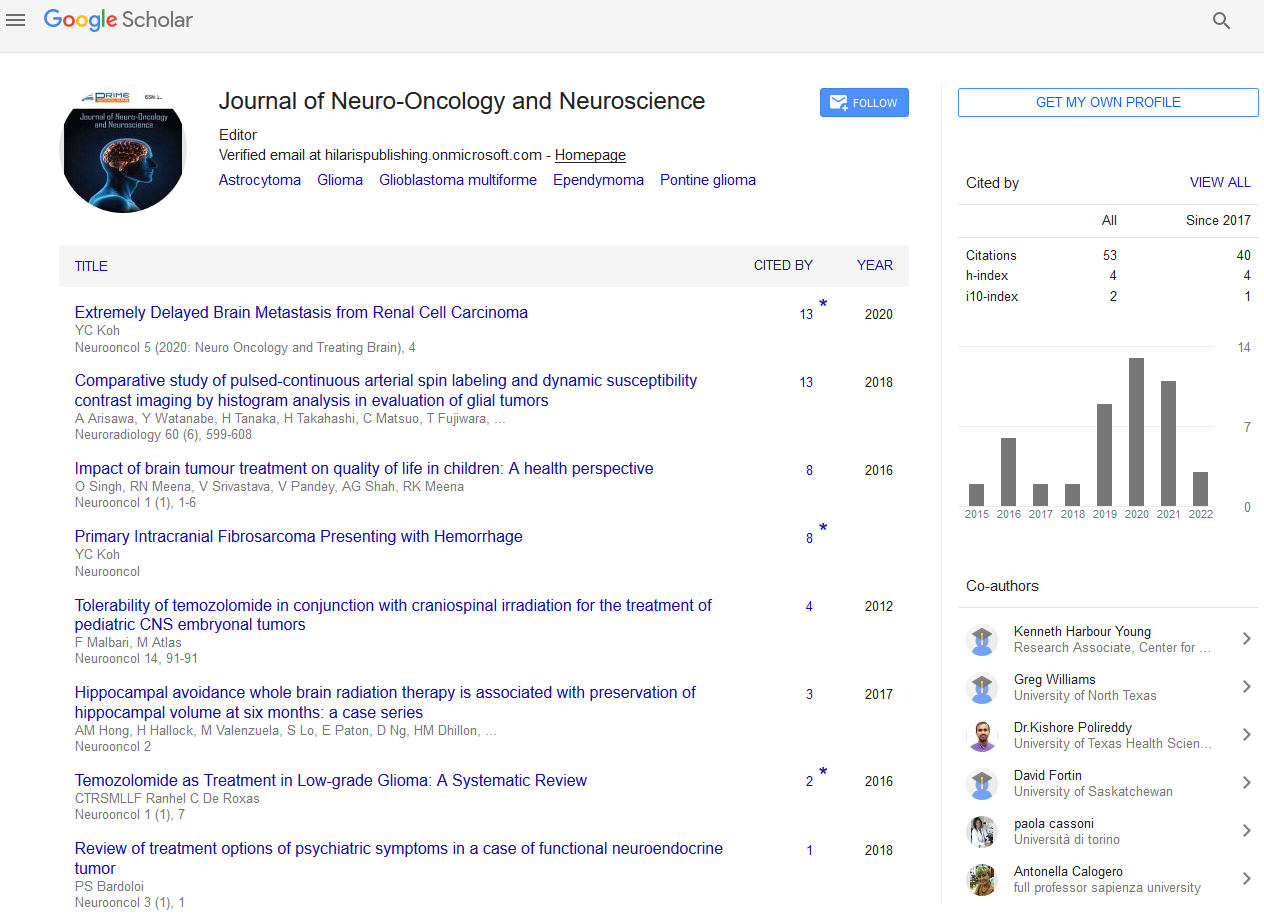Commentary Article - (2023) Volume 8, Issue 4
Palliative Care in Neuro-oncology: Enhancing Quality of Life amidst the Journey
Anthony Hellwege*
Department of Neurosurgery, Medical University Vienna, Austria
*Correspondence:
Anthony Hellwege,
Department of Neurosurgery, Medical University Vienna,
Austria,
Email:
Received: 29-Nov-2023, Manuscript No. IPJNO-24-19620;
Editor assigned: 01-Dec-2023, Pre QC No. IPJNO-24-19620 (PQ);
Reviewed: 15-Dec-2023, QC No. IPJNO-24-19620;
Revised: 20-Dec-2023, Manuscript No. IPJNO-24-19620 (R);
Published:
27-Dec-2023, DOI: 10.21767/2572-0376.8.4.35
Description
For patients diagnosed with neuro-oncological conditions, the
journey is often marked by complex challenges, both physical
and emotional. Palliative care serves as a crucial aspect of
comprehensive cancer care, focusing on alleviating symptoms,
managing distress, and enhancing quality of life for patients
and their families. In the context of neuro-oncology, where
symptoms can be particularly debilitating and treatment
options limited, palliative care plays an essential role in
providing holistic support and comfort throughout the disease
trajectory.
Palliative care in neuro-oncology encompasses a
multidisciplinary approach that addresses the diverse needs of
patients facing brain tumors and other central nervous system
malignancies. The primary goal of palliative care is to improve
symptom management, addressing common symptoms such as
pain, fatigue, nausea, cognitive impairment, and psychological
distress. Through the use of pharmacological interventions,
supportive therapies, and psychosocial support, palliative care
specialists work collaboratively with the oncology team to
optimize symptom control and enhance patient comfort.
One of the key principles of palliative care in neuro-oncology
is early integration into the treatment continuum, beginning
at the time of diagnosis and continuing throughout the disease
trajectory. By initiating palliative care early in the disease course,
patients and their families can benefit from the comprehensive
support and symptom management services that palliative
care provides. Moreover, early palliative care involvement
has been shown to improve patient and family satisfaction,
reduce hospital admissions, and enhance communication and
decision-making regarding treatment goals and preferences.
In addition to symptom management, palliative care in
neuro-oncology focuses on addressing the psychosocial and
existential distress experienced by patients and their families.
Coping with a diagnosis of brain tumor can evoke feelings of
anxiety, depression, grief, and existential distress, affecting
patients’ emotional well-being and overall quality of life.
Palliative care specialists provide counseling, support groups,
and spiritual care to address these psychological and existential
concerns, helping patients and families navigate the emotional
challenges of living with a life-limiting illness.
Furthermore, palliative care emphasizes communication and
shared decision-making, empowering patients to actively
participate in their care and make informed choices aligned
with their values and preferences. Advance care planning
discussions, including goals of care, treatment preferences,
and end-of-life wishes, are integral components of palliative
care in neuro-oncology. By facilitating open and honest
communication between patients, families, and healthcare
providers, palliative care ensures that treatment decisions are
informed by patients’ values, beliefs, and goals, promoting
autonomy, dignity, and respect throughout the care continuum.
Moreover, palliative care extends beyond the patient to
encompass support for family caregivers who play a vital role in
the care and support of their loved ones with neuro-oncological
conditions. Caregiving for a loved one with a brain tumor can
be physically, emotionally, and financially demanding, leading
to caregiver burden, stress, and burnout. Palliative care
provides education, respite care, and psychosocial support to
caregivers, helping them navigate the challenges of caregiving
and maintain their own health and well-being.
Despite the many benefits of palliative care in neuro-oncology,
significant barriers to access and utilization exist, including
misconceptions about palliative care, inadequate training
among healthcare providers, and limited availability of palliative care services in certain settings. Addressing these barriers
requires a concerted effort from healthcare institutions,
policymakers, and advocacy groups to raise awareness, expand
access to palliative care services, and integrate palliative care
into standard oncology practice.
Palliative care plays a critical role in enhancing quality of life
and providing comprehensive support for patients with neurooncological
conditions and their families. By focusing on
symptom management, psychosocial support, communication,
and shared decision-making, palliative care ensures that
patients receive holistic, person-centered care throughout
the disease trajectory. Through early integration, proactive
symptom management, and interdisciplinary collaboration,
palliative care in neuro-oncology strives to alleviate suffering,
promote dignity, and improve overall well-being for patients
facing the challenges of brain tumors and other central nervous
system malignancies.
Acknowledgement
None.
Conflict Of Interest
The author’s declared that they have no conflict of interest.
Citation: Hellwege A (2023) Palliative Care in Neuro-oncology: Enhancing Quality of Life amidst the Journey. Neurooncol. 8:035.
Copyright: ©2023 Hellwege A. This is an open-access article distributed under the terms of the Creative Commons Attribution License, which permits unrestricted use, distribution, and reproduction in any medium, provided the original author and source are credited.

